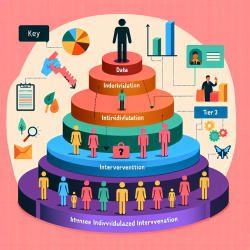Introduction
Developmental Coordination Disorder (DCD) is a condition that significantly affects motor skills, and it often coexists with other developmental challenges, including language impairments. Recent research highlights the importance of phonological awareness (PA) and rapid automatic naming (RAN) in understanding the reading development of children with DCD. This blog post explores the implications of these findings for practitioners and suggests ways to enhance intervention strategies.
Key Findings from the Research
The study titled "Rapid automatic naming and phonological awareness deficits in preschool children with probable developmental coordination disorder" provides valuable insights into the linguistic challenges faced by children with DCD. Here are some key findings:
- Children with probable DCD performed worse on PA and RAN tests compared to their typically developing peers.
- Manual dexterity showed a significant correlation with RAN abilities, indicating a link between motor skills and naming speed.
- Preschoolers with DCD were more likely to have deficits in PA and RAN, increasing their risk of reading difficulties.
Implications for Practitioners
Understanding the relationship between motor skills and language processing can guide practitioners in developing more effective interventions. Here are some strategies based on the research findings:
- Early Screening: Implement early screening for PA and RAN deficits in preschoolers, especially those with known motor skill challenges.
- Integrated Interventions: Design interventions that simultaneously target motor skills and language processing. Activities that enhance manual dexterity could potentially improve RAN abilities.
- Focus on Automaticity: Encourage activities that promote automatic visual perceptual-motor coordination, which may help improve naming speed and phonological processing.
Encouraging Further Research
While this study provides a foundational understanding, further research is needed to explore the nuances of DCD and its impact on language development. Practitioners are encouraged to contribute to this field by investigating:
- The effectiveness of specific interventions targeting PA and RAN in children with DCD.
- The long-term academic and social outcomes for children with DCD who receive early intervention.
- Neuroanatomical studies to better understand the brain mechanisms underlying these deficits.
Conclusion
The research underscores the importance of early identification and intervention for children with DCD. By focusing on both motor and language skills, practitioners can help mitigate the risk of reading difficulties and improve overall developmental outcomes. To delve deeper into the original research, please follow this link: Rapid automatic naming and phonological awareness deficits in preschool children with probable developmental coordination disorder.










